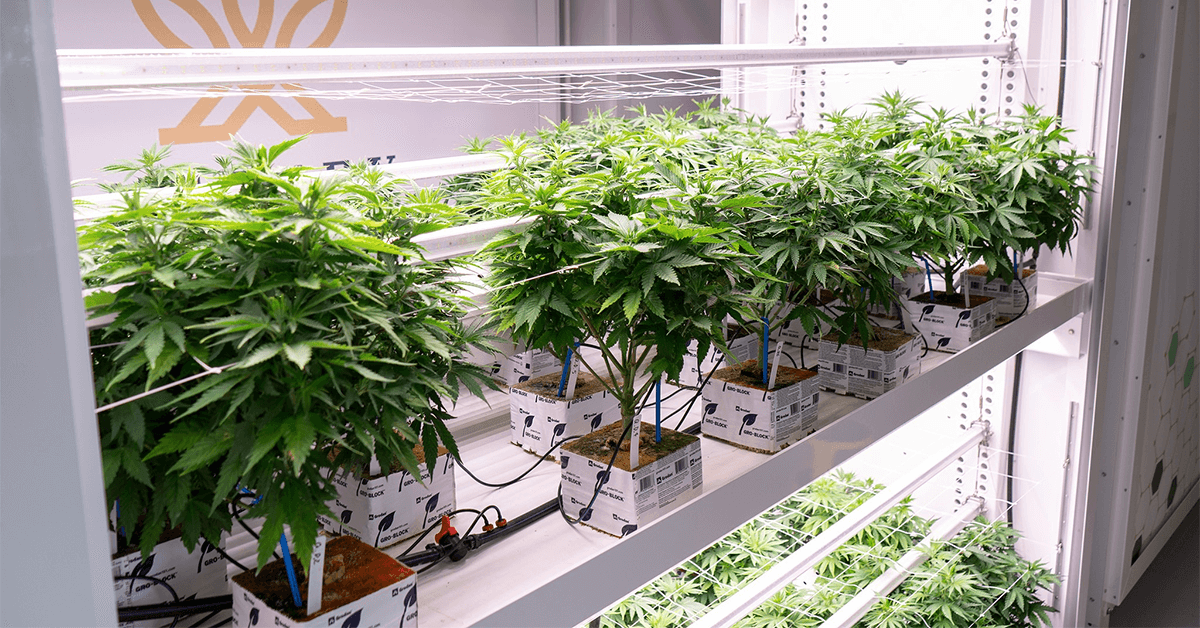Shutdown of butter's Cultivation Operations Sparks Online Discussion

Update: butter has officially posted a statement over on their LinkedIn profile.
On Monday, August 26th we began a difficult transition at our cultivation facility in Flint, Mi. Due to the heightened costs of production and price compression in the Michigan market, we were faced with the unfortunate need to downsize staff and pivot our production strategy to focus more on providing exceptional products and customer service. Both butter retail facilities in Berkley and Ann Arbor are fully operational, and we look forward to continuing to service customers in those communities. Thank you for your patience while we work through this shift. We are immensely grateful for your continued support and understanding.
Rumors are spreading online that the Michigan cannabis brand butter may be shutting down its operations entirely. These claims originated from a Reddit thread on the Michigents subreddit, where users have reported that the company's Flint-based cultivation facility was unexpectedly closed yesterday.
Claims Made in the Reddit Thread
The initial post in the Reddit thread alleges that butter's cultivation facility was suddenly closed, catching many by surprise. The poster, who appears to have worked for the company, mentioned that employees were notified of the shutdown earlier in the day. According to the post, the sudden closure has led to concerns among staff and customers about the future of the brand.
Several Reddit users have commented on the thread, sharing their own observations and experiences with butter in recent months. Some have noted issues with product availability, suggesting that inventory levels had been inconsistent. Others mentioned that they had noticed signs of financial strain or operational difficulties within the company, which may have contributed to the alleged closure.
One user claimed that the company had been dealing with regulatory challenges, which could be a factor in the reported shutdown. However, these claims have not been verified, and no official information has been released by butter to confirm or deny these rumors.
No Official Statement from butter
As of now, there has been no official statement from butter regarding the alleged closure. The lack of communication from the company has fueled further speculation and concern among those who follow the Michigan cannabis industry closely. Some users on Reddit have expressed frustration at the uncertainty, particularly those who are regular customers of butter products.
Potential Impact on the Market
If the rumors are accurate, the closure of butter would mark a significant shift in the Michigan cannabis market. butter has been a recognizable name, known for its cultivation practices and product offerings. The loss of a brand like butter could impact not only consumers but also dispensaries that rely on its products.
The situation, as described by Redditors, also highlights the challenges that cannabis companies in Michigan face, including maintaining regulatory compliance, managing financial pressures, and competing in a crowded market.
What's Next?
Until butter issues an official statement, the status of the company remains uncertain. The Reddit thread has certainly sparked conversation and concern, but without confirmation, it's difficult to assess the full scope of what's happening. Those interested in the outcome will likely be monitoring both official channels and online discussions closely in the days to come.
New Line Processing Launches Credit Solution for Michigan Cannabis Buyers

Michigan's cannabis industry has long faced financial challenges due to federal restrictions that prevent the use of traditional banking services for transactions. Specifically, credit card companies like Visa and Mastercard, which are federally chartered, have prohibited their use in cannabis-related transactions. This has left both dispensaries and customers in Michigan grappling with limited payment options, often resorting to cash-only transactions.
In response to these challenges, New Line Processing, a New York-based company, is stepping into the Michigan market with a new financial product designed to help cannabis businesses and consumers navigate these restrictions. Founded in 2014, New Line Processing focuses on supporting regulated and restricted industries, with cannabis being one of its core competencies.
A New Approach to Cannabis Transactions
Dan Abadir, CEO of New Line Processing, recently shared details about their new product in an interview. The company is introducing a closed-loop credit system that provides cannabis consumers with revolving lines of credit, which can be used at participating dispensaries. This system, named Omn Credit, is designed to bypass the restrictions imposed by traditional credit card companies while ensuring compliance with state and federal regulations.
The credit limits offered through this system range from $250 to $1,000, depending on the creditworthiness of the applicant. This approach is particularly well-suited to the cannabis market, where the average transaction value hovers around $100 to $140. By offering modest credit limits, the system minimizes risk while providing consumers with convenient access to credit for their purchases.
How It Works
When a customer enters a participating dispensary, they will be screened using a device provided by New Line Processing. This device verifies the customer's identity and checks for any potential fraud, using data from the DMV and other sources. Once approved, the customer receives an SMS notification with a link to complete their account setup, which involves creating a user ID, password, and accepting the terms and conditions. Upon completion, the customer is issued a digital QR code, which serves as their credit account for purchases.
Unlike other financial instruments that act as intermediaries, such as stored-value cards, this revolving credit line functions similarly to traditional credit cards, except it operates entirely within the cannabis industry's legal framework. The dispensaries benefit from this system as well, receiving free equipment from New Line Processing to facilitate the credit application and transaction process.
A Step Towards Greater Financial Inclusion
While initially designed to assist consumers with limited or weak credit, the Omn Credit system aims to attract a broad range of customers, including those with prime and mid-prime credit ratings. The goal is to expand the product's footprint beyond the cannabis industry, eventually making it a general-purpose financial tool available across various sectors.
This innovative solution offers a much-needed financial service to Michigan's cannabis market, potentially setting a new standard for how transactions in regulated industries can be handled. As New Line Processing continues to grow, it aims to make Omn Credit a household name, providing consumers with a reliable and compliant way to finance their purchases in the evolving cannabis industry.
For more information about New Line Processing and their credit solutions, visit newlineprocessing.com.
Ironwood Welcomes Newest Cannabis Dispensary, Levels Supercenter

Ironwood, Michigan, is welcoming yet another cannabis dispensary, bringing the total number in this small town to five. With a population of less than 5,000, Ironwood, located on the border of Wisconsin, has quickly become a hub for cannabis retail. The first dispensary to set up shop was Higher Love, followed by Rize. In more recent years, High Profile opened its doors, and The Firestation Cannabis Company also joined the lineup. Now, the latest addition is Levels Cannabis Supercenter, set to hold its grand opening on August 24th-25th.
The news of Levels Cannabis Supercenter's arrival spread through the town via a flyer that made its way into local mailboxes. The flyer, filled with bold promotions, highlighted their aggressive marketing strategy, which includes prize giveaways, drawings, and a promise to price match. The flyer also prominently states, "21+ Out Of State Welcome," targeting potential customers from nearby Wisconsin and Minnesota, where cannabis laws are much stricter. Notably, Wisconsin has yet to legalize cannabis even for medical use, making Ironwood an attractive destination for residents from neighboring states seeking legal cannabis products.
The opening of Levels Cannabis Supercenter underscores the growing competition among dispensaries in Ironwood, each vying for a share of the lucrative cross-border market. This competition has led to creative promotions, such as High Profile's recent offer of gas money to customers who show a Minnesota driver's license, further cementing Ironwood's reputation as a key access point for cannabis in the region.
Cannabis Industry Defies Inflation with Falling Prices in Michigan

Inflation has been a significant concern across the U.S., as the cost of basic necessities has surged over the past few years. While some of these increases have stabilized, many essential items remain much more expensive than they were just a few years ago.
In the past year alone, prices have risen by an average of 3.4%, following a 3.8% increase the previous year. However, one industry in Michigan has not only avoided these inflationary pressures but has also seen a significant price reduction: the cannabis industry.
The Impact of Inflation on Daily Necessities
Grocery shopping has become a strain on many household budgets. A week's worth of groceries, which once cost around $50, now easily surpasses $80 or $90. Shoppers are turning to off-brand products and even abandoning organic options in an effort to save money. Despite these efforts, the higher cost of living is a reality that many Michiganders are grappling with daily.
Yet, amidst these challenges, Michigan's cannabis consumers have found some relief. While nearly everything else has become more expensive post-pandemic, cannabis prices in the state have significantly decreased.
Cannabis Prices Plummet in Michigan
Unlike other industries, which have been hit hard by inflation, Michigan's cannabis market has seen prices drop. In 2020, the average cost of an ounce of cannabis in the state was $419.39, placing Michigan among the most expensive states for cannabis, behind only Illinois and Maine.
However, competition within Michigan's cannabis industry has driven prices down rapidly. Today, the average price for an ounce of cannabis in Michigan is just $91.71, making it one of the most affordable states in the country for cannabis consumers.
Why Michigan's Cannabis Prices Have Fallen
The unique dynamics of the cannabis industry in Michigan have contributed to this price drop. Cannabis in the state is not subject to federal taxation and is not traded on national stock markets, meaning prices are driven primarily by local supply and demand.
Michigan's robust competition among dispensaries and cultivators has been a key factor in keeping prices low. Additionally, unlike states such as Illinois, Michigan does not impose exorbitant taxes on cannabis, which further contributes to the affordability of the product.
A Silver Lining for Cannabis Consumers
As Michiganders navigate the challenges of rising costs in nearly every sector, the state's cannabis industry offers a rare example of prices moving in the opposite direction. For those who use cannabis, this industry not only provides some financial relief but also underscores the benefits of strong local competition and thoughtful regulation.
While the side effect of cannabis might be an increased appetite, leading to higher grocery bills, at least the cannabis itself is more affordable than ever.
Michigan's Cannabis Market Faces Minimal Impact from Ohio's New Sales

As Michigan approaches the fifth anniversary of legal cannabis sales, Ohio has joined the growing list of U.S. states offering recreational cannabis. Ohio's market officially opened on Tuesday, August 6th, with 120 stores licensed to sell cannabis to adults aged 21 and over who present valid identification.
In its first five days, Ohio's cannabis sales reached $11.5 million, averaging nearly $2.3 million per day, according to data from the Ohio Department of Commerce. In comparison, Michigan's cannabis market is generating approximately $9 million in daily sales—more than triple Ohio's average.
Despite Ohio's noteworthy launch, the new competition has had little noticeable impact on Michigan's cannabis market, even for retailers near the border who rely heavily on sales to Ohio residents.
Camden Miller, a manager at Pinnacle Emporium in Morenci, Michigan, located near the Ohio border, expressed minimal concern about Ohio's entry into the market. "At the moment, we're not too worried about it," Miller said. "The supply and demand isn't there yet in Ohio, and just like Michigan ... until you get it oversaturated, you're not going to see prices come down. Within the next few years, I'm sure it will start having more of an impact."
Projections suggest Ohio's cannabis market could reach $1.5 billion in its first year, potentially bringing in nearly $150 million in new excise taxes. However, Ohio currently has only a few stores within a 30-minute drive of the Michigan border, including two in Toledo and one in Bowling Green. The Ohio Department of Cannabis Control has plans to license more stores in the future.
For now, Ohio residents appear willing to travel to Michigan for better deals and more extensive product selections. Miller noted that a significant portion of Pinnacle Emporium's business comes from out-of-state customers, including many from Ohio, who often place large orders. "We've already had customers coming in and saying the prices in Ohio are crazy right now," Miller said.
Price discrepancies between the two states are striking. Ohio stores are reportedly selling 1.6 grams of cannabis flower for nearly $50, while Michigan retailers offer eighths (2 grams) for as low as $8. In Ohio, the average price for an ounce of cannabis during the first week of sales was about $266, whereas in Michigan, the average price dipped to just under $80 per ounce in July, according to the Michigan Cannabis Regulatory Agency (CRA).
Harrison Carter, a manager and co-owner of NAR Cannabis in Monroe, Michigan, about 12 miles north of the Ohio border, emphasized the price advantage Michigan holds. "There is such a large price discrepancy with the abundance of supply that exists in Michigan and the under-supply that currently exists in Ohio that consumers are making decisions that are very much budget-based," Carter said.
Although Ohio's tax structure is slightly higher, with a 10% excise tax and a state sales tax of 5.75% (plus varying local taxes), compared to Michigan's 10% excise tax and 6% state sales tax, the higher product costs in Ohio may deter some consumers from shopping locally.
The Michigan Cannabis Regulatory Agency declined to comment on Ohio's market launch or its potential impact on Michigan. Meanwhile, Ohio officials have expressed satisfaction with the initial rollout of their recreational cannabis market. "The Division of Cannabis Control has been closely monitoring these first days of non-medical sales and has been extremely impressed with the level of seriousness and responsiveness the industry has shown in meeting the requirements," said Jamie Crawford, spokesperson for the Ohio Department of Commerce. "As we move forward, the division's top priority will remain on the safe and legal sale and regulation of both medical and non-medical cannabis for Ohioans who choose to use them."
Michigan's Mature Market
Michigan's cannabis market, which has been growing since the first licensed businesses began operating in December 2019, benefits from a more flexible licensing program than Ohio's. This has led to significant growth, with Michigan stores having sold nearly $10 billion in cannabis products to date, including approximately $1.3 billion in medical marijuana sales.
The recreational market in Michigan is expected to surpass $3.3 billion in sales over the next year. As of July, Michigan had over 800 licensed stores, with grow and processing operations managing 1.7 million cannabis plants in the pipeline.
In contrast, Ohio's cannabis infrastructure is still developing. The Ohio Department of Commerce recently listed 46 licensed processors, 37 growers, and 120 stores with certificates of operation. Ohio's Division of Cannabis Control, established following a November 2023 ballot initiative passed by 57% of voters, oversees the state's cannabis licenses, similar to a state liquor control commission. Local municipalities in Ohio can impose zoning restrictions or moratoriums on cannabis businesses, further limiting market growth.
Michigan's less restrictive licensing approach has led to clusters of cannabis shops in municipalities that permit recreational sales, particularly along state borders. For example, Monroe, Michigan, near the Ohio border, is home to 18 licensed cannabis shops despite a population of only about 20,300. In Morenci, there is one cannabis shop for every 450 residents.
This liberal licensing has resulted in unique market dynamics in Michigan, including low prices and high competition. Nearly 20% of the retail licenses issued since the market's inception no longer exist, reflecting the market's volatility. Despite these challenges, Michigan retailers view the competitive environment as beneficial for consumers, offering them a wide range of options at low prices.
"We're very much focused on ourselves here in Michigan," said Carter of NAR Cannabis. "We're continuing to offer not only good service but good products at affordable prices ... We're very much in an oversupply moment, and we're able to hit certain price points that a lot of Ohio consumers are frankly used to at this point."
Agrify Reports Q2 Loss as Revenue Drops and Cash Reserves Dwindle

Agrify Corp. (NASDAQ: AGFY), a Michigan-based company specializing in cannabis cultivation equipment, reported a net loss of $2.8 million for the second quarter of 2024. Although the loss marks an improvement from the $6.8 million deficit reported in the same quarter last year, it comes despite a significant drop in revenue.
The company's quarterly revenue fell to $2.9 million, nearly halving from $5.1 million in the second quarter of 2023. However, this figure represents a slight increase from the $2.6 million reported in the first quarter of 2024. Over the first half of the year, Agrify's total revenue reached $5.5 million, down from $10.8 million during the same period in 2023.
CEO Raymond Chang, in a recent press release, hinted at the company's precarious financial position, revealing that Agrify had just $53,000 in cash as of June 30th. Chang acknowledged the need for additional capital, particularly after the collapse of a proposed merger with Nature's Miracle in May, which had the potential to provide much-needed financial relief.
"2024 continues to present significant challenges, with the cannabis industry cautious about future investments due to regulatory uncertainties and limited access to capital," Chang stated. "Despite our ongoing efforts to cut costs and manage payables, our limited cash reserves remain a significant barrier to growth. The company will therefore continue to explore all strategic options to maximize shareholder value."
Agrify faced the threat of being delisted from the Nasdaq exchange last fall. In May, the company converted $13.8 million of its debt into equity, enabling it to comply with Nasdaq's requirements and maintain its listing.
As of the end of the second quarter, Agrify reported total assets of $39.6 million, which includes the $53,000 in cash, against total liabilities of $30.8 million. The company also carries an accumulated deficit of $264.3 million, highlighting the significant financial challenges it faces as it seeks to navigate the turbulent cannabis market.
For those interested in the financial side of the cannabis industry, an exclusive opportunity awaits. By signing up through our Robinhood referral link, you might secure a free portion of Agrify stock, making you a part of the groundbreaking journey of companies like Agrify in the cannabis sector. Explore this chvance and potentially start your investment journey in the burgeoning cannabis market.


 Helpful Links
Helpful Links